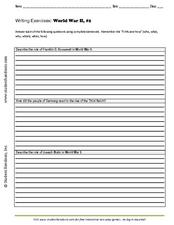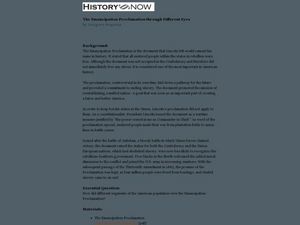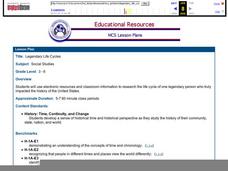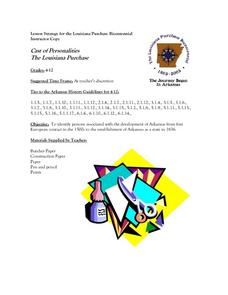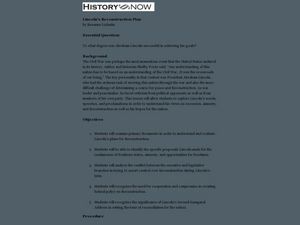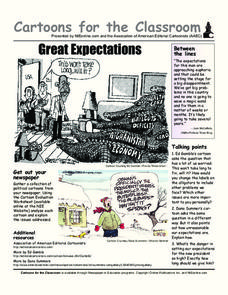National Endowment for the Humanities
The 1828 Campaign of Andrew Jackson: Changes in Voting Participation
Students give examples to indicate how voting participation changed in the first half of the 19th century, and make connections between changes in voting participation and the results of the election of 1828.
Curated OER
The Election Is in the House: 1824: The Candidates and the Issues
High schoolers list some changes in presidential election laws and/or procedures since 1796, and cite examples from presidential campaign materials from 1824.
Curated OER
The Monroe Doctrine: Whose Doctrine Was It?
Was James Monroe the sole contributor of the Monroe Doctrine? Young scholars study the doctrine and cite evidence to show contributions of John Quincy Adams and Thomas Jefferson in its formulation.
Curated OER
Writing Exercises: World War II, #2
Comprehending the role of key players and events of WWII is a task all learners must undertake. Here, they respond to three critical thinking questions regarding the roles Roosevelt and Stalin played during the war as well as Germany's...
Curated OER
The Emancipation Proclamation Through Different Eyes
Students examine how various segments of the American population viewed the Emancipation Proclamation. They read the Emancipation Proclamation, analyze key terms and statements in the document, and participate in a debate.
Curated OER
The Federalist Defense of Diversity: Extending the Sphere
How did early Americans ensure expansion while also securing the rights of citizens? Alexander Hamilton and James Madison, two of our early leaders, considered the problem of faction to be the "mortal disease" that created unstable...
Curated OER
Iran Hostage Crisis: Reading Primary Documents
Following brief instruction about the Iran Hostage Crisis during Jimmy Carter's presidency, small groups read three-page sections from the diary of hostage Robert C. Ode. They write editorials from the perspective of either U.S. citizens...
Curated OER
End of WWI: The Treaty of Versailles
After learning about the causes and closure of WWI, hand out this resource on that outlines the differences between Wilson's 14 Point Plan and the Treaty of Versailles. The class reads the information provided then analyzes two political...
Curated OER
Legendary Life Cycles
Upper elementary historians research a legendary person who had an impact in the the history of the United States. Learners research the life of their person of choice, and construct a legendary timeline using computer software which...
Curated OER
"Declaration of Independence" From Plagiarism
So, what does the Declaration of Independence even mean? Learners of all ages paraphrase the Declaration of Independence in modern terms. They work as a group or class to paraphrase the language of the Declaration of Independence. There...
Curated OER
Let There Be Peace: Nobel Prize Winners
What is the Nobel Peace Prize? After they establish criteria for great leadership, secondary learners read a New York Times article about President Jimmy Carter's acceptance of the Nobel Peace Prize in 2002. Individuals research the...
Curated OER
The Importance of Inauguration Day
As Inauguration Day approaches, prepare your learners by researching the protocol of years past.
Curated OER
Compare the Presidents
How are Nicolas Sarkozy and Barack Obama similar? How are they different? Look at two visual representations of them; what kind of first impression does they give you? After comparing the presidents, learners complete a proverb matching...
Curated OER
The Gettysburg Address
Who was Abraham Lincoln, and what is the Gettysburg Address? Sixth graders participate in a seminar where they read and analyze the Gettysburg Address and its importance. The role of Abraham Lincoln during the Civil War is also...
Curated OER
Cast of Personalities - The Louisiana Purchase
The origins of the state of Arkansas are the focus of this history lesson plan. Elementary schoolers to high schoolers identify persons associated with the development of the state from the very first European contact to statehood in...
Curated OER
Lincoln's Reconstruction Plan
Students explore Lincoln's Reconstruction plan. In this Reconstruction lesson, students examine Lincoln's speeches and writings on bringing the country back together following the war.
Curated OER
The Perfect President
Young scholars advertise for the perfect president. In this presidential duties lesson, students determine the attributes that the ideal president should have and then write job descriptions for the role.
Curated OER
Fourth of July Addition and Subtraction
What is Thomas Jefferson signing? Focus on American history with this cross-curricular math puzzle. Learners utilize addition and subtraction skills to solve the mystery of the Fourth of July. All numbers are 3-digit, and there are no...
Curated OER
Making a Report to President Washington
Learners gain an understanding of some of the challenges the U.S. faced at its birth. They are asked to compose a report on the state of the nation in 1790 (addressed to President George Washington), which includes a narrative, maps and...
Curated OER
Cartoons for the Classroom: Obama as the New Sisyphus
Reveal how Greek Mythology can play into American politics through this political cartoon, where President Obama is depicted as Sisyphus. Background information gives scholars access to the cartoon's context, and three talking points...
Curated OER
Early Presidents
Students are introduced to the lives and contributions of the first seven presidents of the United States. They, in groups, conduct further research on one of these president and his political platform and design a presentation for the...
Curated OER
Differing Federal Responses to the Great Depression: Letter Analysis
Young analysts examine two letters, one written by President Hoover and one written by FDR. Each letter contains that president's response to the role of the Federal Government during times of crisis (The Great Depression). They analyze...
Curated OER
Jimmy Carter: Civic Action, Lesson 2
Build on high schoolers' awareness of what's wrong with society. Here they examine Jimmy Carter's extensive involvement in volunteer action in the local, national, and global arenas. Define and explore concepts -- philanthropy, citizen,...
Curated OER
Cartoons for the Classroom: Great Expectations
Learners can use this worksheet to discuss the expectations placed on the Obama presidency. Included are two cartoons to analyze, a web site to visit, several great discussion questions, and a short activity. This is one worksheet that...





